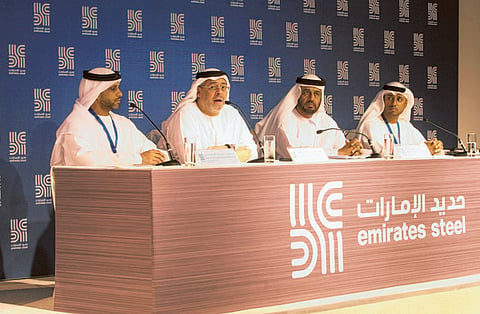Emirates Steel launches Phase II costing Dh7b
Company’s total production capacity increases to 3.5 million metric tonnes per annum

Abu Dhabi: Emirates Steel on Wednesday inaugurated the completion of its Dh7 billion ($1.9 billion) phase II expansion programme in the Industrial City of Abu Dhabi with expectations to reach the highest capacity in the beginning of 2013 after gradual ramp up in production.
Emirates Steel launched the two-phased Dh10 billion ($2.72 billion) expansion programme in January 2006, completing Phase I in June 2009 at a cost of Dh3 billion ($816 million), more than doubling production capacity; making it the largest steel plant in the UAE and the region, capable of manufacturing raw steel from iron oxide pellets.
Hussain J. Al Nowais, Chairman of General Holding Corporation (GHC), parent company of Emirates Steel, told the Gulf News: “Phase II has increased Emirates Steel’s total production capacity to 3.5 million metric tons per annum (MTPA) to the Middle East and North Africa, Europe and Far East, including Hong Kong and Malaysia.”
Al Nowais said that Emirates Steel will soon become one of the largest steel complexes of its kind in the region. The objective, he added, was to satisfy local and regional demand for steel. He stressed that GHC will bolster its efforts to promote the industrial sector in Abu Dhabi by setting up special industrial units capable of adopting the latest technologies and offering qualified UAE nationals work opportunities.
Al Nowais added: “Such a development is part of the massive endeavour that is set to increase Emirates Steel’s production to around 5.5 million MTPA within the next three years.”
Suhail Mubarak Al Ameri, Emirates Steel Chairman and CEO of GHC, said that the steel industry has seen staggering growth in light of the quickening pace of Abu Dhabi’s development and construction.
He pointed out that demand for heavy sections in the Mena region continues to skyrocket, currently translating to 5.5 million MTPA and this figure is predicted to increase to 8.6 million MTPA in 2020.
“Phase 2 has elevated our stature in the industry for being able to provide a more cost-effective, flexible and sustainable solution to concrete, which has proved invaluable to local and regional markets,” said Al Ameri.
Saeed Ghumran Al Romaithi, Emirates Steel CEO, said: “the Company is now the sole producer of jumbo and heavy sections in the Mena region, which will offer improved products and drastically reduced lead times in terms of piece count and cut-to-length services”.
Al Romaithi added that Emirates Steel expansion has both directly and indirectly created over 2,000 jobs in the country; in parallel, many high-profile technical jobs opportunities have opened up for UAE Nationals. The company’s workforce is comprised of 25 per cent UAE nationals.
No subsidies needed
Al Nowais told the Gulf News that the company is financially strong and it is profitable.
“We don’t need any state subsidies. We currently meet our financial obligations. I can proudly say we are profitable with positive cash flow. We are capable to pay our due ahead of time,” he clarified.
With regard to initial public offerings (IPO)s, Al Nowais said: “We are profitable. We are achieving sustainable profits and we are ready for competition in international markets. Through we are ready for IPOs, this topic has not been discussed so far. However, this might take place in a year or two.”
He added that phase III is expected to be launched within a year and would cost $ 1 billion.
Al Nowais pointed out that Emirates Steel will soon be one of the largest steel complexes in the region by bolstering efforts to promote the industrial sector in Abu Dhabi by setting up special industrial units capable of adopting the latest technologies and offering qualified UAE national work opportunities.
“Steel production has been invaluable to the emirate’s progress, not only in supporting rapid construction but in accelerating the growth of non-oil based gross domestic product, which further serves economic diversity.”
Sign up for the Daily Briefing
Get the latest news and updates straight to your inbox



